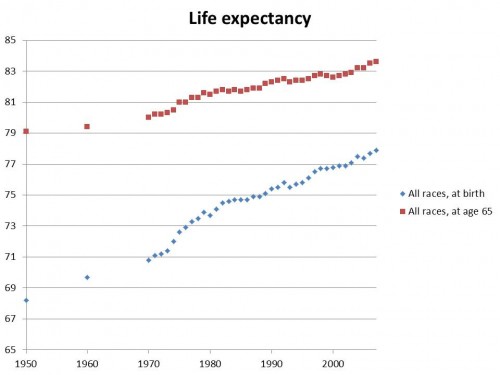Andrew Sullivan highlights some UK data, and says longer than we think:
Possibly longer than most people are planning for:
The IMF asks what would happen if life expectancy by 2050 turns out to be three years longer than current projected in government and private retirement plans: “[I]f individuals live three years longer than expected–in line with underestimations in the past–the already large costs of aging could increase by another 50 percent, representing an additional cost of 50 percent of 2010 GDP in advanced economies and 25 percent of 2010 GDP in emerging economies.
The usual caution should be applied here. Most of these increases are likely because of gains made in early childhood:
Let’s take a theoretical cohort of 100 people. Let’s stipulate that the life expectancy at birth of this group is 74. In this cohort there is a baby who dies soon after birth, and there are also 25 people who live past the age of 65.
Scenario A: I manage to find an excellent treatment for what kills the baby in the cohort. It’s not perfect, but it allows the baby to live to age 50.
Scenario B: I manage to find a treatment for a common illness that afflicts elderly people, and can extend their life an average of 2 years.
In both these scenarios, I have managed to add 50 years to the cohort. So the average life expectancy at birth has increased to 74.5 years. But this, hopefully, shows you the enormous power of saving one baby or child, in that saving one infant for fifty years is the same as saving 25 adults for only 2 years. The take home message here is that treating children well does far more to increase life expectancy at birth than treating adults for illnesses that kill them.
And we’ve had remarkable improvements in the treatment of children and chronic diseases in the last few decades. Vaccines do wonders. We can treat many illnesses that used to kill children far into adulthood now. Many childhood cancers can be cured. Saving those children has resulted in relatively big increases in the overall life expectancy at birth…
And, as I’ve shown many times, life expectancy at age 65 is not going up nearly as fast as life expectancy at birth:
Life expectancy is going up, but not nearly as quickly and as much as people might think from the chart at The Dish. Adults looking towards retirement should prepare appropriately, but not panic.


